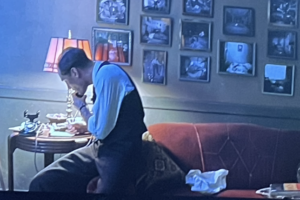Last month’s issue of the River Journal featured a story by David Nielson regarding the changes in his life since he had children. In particular, he talked about how so many of his social interactions now are because of connections made through his children, and how foreign this is from the life he had before becoming a father.
This article hit home for me because I also struggle with my place in the social structure as do most of us, I assume. But, unlike Mr. Nielson, some of us ponder our place in the world because we don’t have families. I am childless by choice and currently single. Most of my friends are married with young families. I don’t have siblings and my parents have both died. Whereas the lives of parents sound hectic and their schedules revolve around children’s activities, my life is hectic due to work, but once I leave the office, once my pets are taken care of, I don’t have the obligations and connections the young families do.
So I got to thinking about the upcoming holidays, and what it’s like for those with families versus those who are single and/or have no extended family, or those who are divorced and have to deal with visitation schedules. Many of us don’t live near our parents anymore which often leaves the elderly to fend for themselves during a time when we are supposed to be festive and embrace our family connections. As my brain kept circling this topic, I thought how we all could use a reminder about what the holiday season is supposed to mean, and how to be thoughtful and remember to spread good cheer where it is needed.
Until I was ten years old, we spent most holidays at my maternal grandparents’ home in Dyker Heights, Brooklyn. This was a typical Italian neighborhood where it was not unusual to see a few generations of one family getting together, where siblings lived within walking distance of each other, and wonderful smells came from every house. My grandmother cooked enough food to feed the entire borough, and after dinner neighbors, friends, and family still came through the doors for some wine, espresso, snacks, and poker. If it wasn’t enough to have 95 types of cookies to nosh on, at midnight pizzas would go in the oven so we shouldn’t go hungry while the men played poker until 4 am.
After my grandmother died, holidays were very different. And, for most people, the days of having 50 or 60 people coming in and out on a single evening is a foreign concept. Most of us get together with a small group of friends or family, and we are satisfied with this. But some people have nowhere to go and need to know they are not forgotten. For some elderly neighbors, it may be too far to travel to their families. They may be widowed, siblings and peers have died, and they end up spending the holidays alone. Some younger people may have moved away from their families for a job or school and can’t travel back home for the holidays. For people like me, since losing my mother, I don’t have that "default" place to be on a holiday, and I don’t spend every holiday with my cousin and aunt who are still in Brooklyn. I do spend holidays with friends sometimes, but it’s easy to come in "under the radar" when we assume everyone else has a place to go, or we get caught up in our own holiday planning and don’t think to ask what others’ plans are. When you are busy with a million things, when you have a large family, when you feel overwhelmed shuttling your children here and there, it is natural to forget that there are some people who don’t have all those activities and social contacts.
I had an interesting interchange with my friend Chuck not too long ago that opened both our eyes to how the other half thinks. I was complaining that I couldn’t wait for all my friends’ kids to go to college, he was saying how things change when you have children, how your life revolves around their activities. He relayed a story about another friend who mentioned, wistfully, that they used to do a lot together, but that he was rarely invited over anymore. Chuck responded that so much of his life involved his children and other families, that he didn’t think his single friend would want to be included. I suggested that he allow his friend to make the choice, that by not inviting him at all his friend felt rejected and ignored, and, yes, maybe he wouldn’t be interested in going to a preschooler’s birthday party, or attending a barbecue with a dozen children running around, but at least if he was given the choice, he would feel that the friendship was still valuable to him, and maybe would choose to just stop by quickly in order to be included. He said he hadn’t thought of it that way. Likewise, a single friend or elderly neighbor may ultimately choose to spend a holiday alone or volunteering at a soup kitchen, but knowing that they even have the option of spending it in a festive way may make all the difference. I would love to have the option of accepting or turning down three or four invitations for Christmas, even if I decided to spend the day in bed.
Let’s also not forget, in our hectic lives, that there are others who don’t even have the option of sitting with Crazy Aunt Millie over turkey and rolling their eyes at the same family stories. We have many Americans serving overseas who can’t be home for the holidays. They love to get support from back home. You can spread cheer to a member of the armed forces and "adopt" one by logging on to adoptaussoldier.org. They’d give anything for a piece of fruitcake this holiday season. At the very least, we can simply remember to think of each other during this time that is meant for togetherness and celebration.
Dr. Barbara Kapetanakes practices psychotherapy in Sleepy Hollow.






